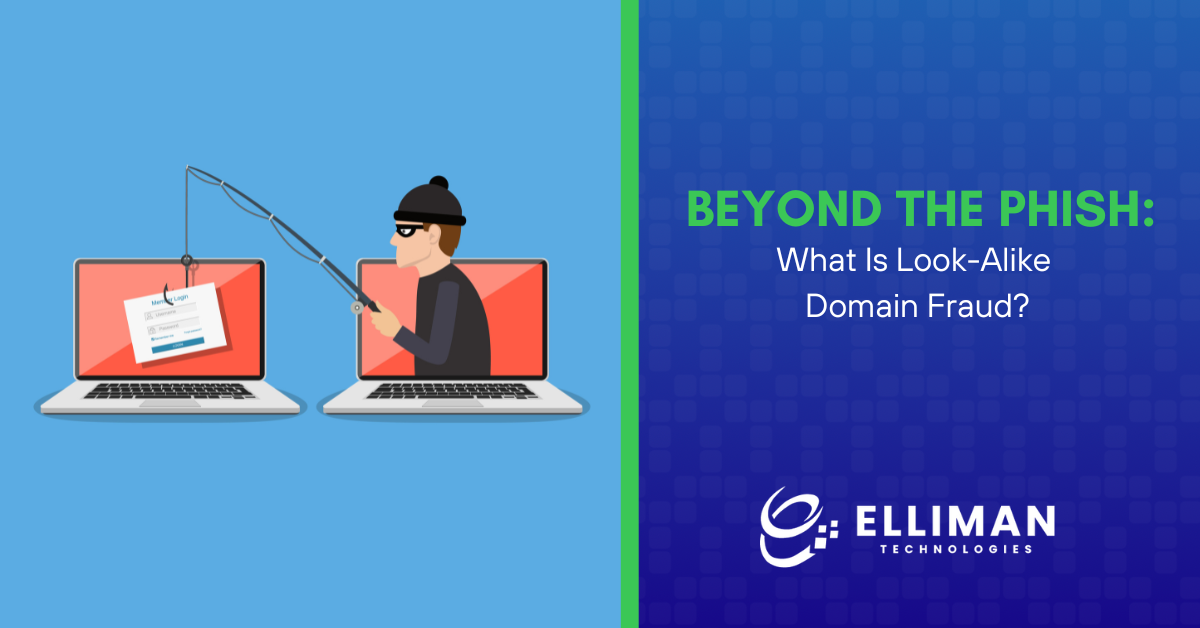It only takes one fake email to cost your business thousands.
Cybercriminals don’t always need to hack your servers or breach your firewalls. Sometimes, just a small mistake or typo in a website address is all they need to put your business at risk.
This is look-alike domain fraud, one of today’s fastest-growing online threats. And here’s the worst part. It just takes one tiny tweak in a web address to fool someone into clicking a harmful link or accidentally sharing sensitive info.
That’s why having reliable IT support matters. It’s not just about the technology; it’s about safeguarding everything you’ve worked hard to build.
What Is a Look-Alike Domain?
A look-alike domain also called a “cousin domain” is a website address designed to mimic a real one. It might have an extra letter, a swapped character, or a slightly different extension. The goal is to trick the eye and the brain into thinking it’s legitimate.
Some examples:
- netfilx.com instead of netflix.com
- goog1e.com (with a number 1) instead of google.com
- amazon-store.com instead of amazon.com
Clicking the link could ask you to log in, install malware, or pay a fake invoice. Once you do, the damage can be irreversible.
Why Do People Fall for It?
It’s not about being careless, but it’s about how our brains are wired.
Our minds tend to focus on the first and last letters of a word. The middle can be jumbled, and we’ll still read it correctly. Scammers understand this and use it to their advantage. It can also be combined with a convincing email message that seems urgent to create the perfect setup for a careless mistake.
Even worse? Many look-alike domains are registered with proper email authentication, like SPF and DKIM. That means they can slip right past your spam filters and land directly in your inbox.
The Real Threat: Business Email Compromise
This type of scam isn’t just about phishing links. It’s about tricking someone into taking action that leads to financial loss.
It’s called Business Email Compromise (BEC), and it’s more common than most people think.
For example, your company’s finance manager is out on vacation. You get an email from a familiar vendor. It looks legitimate. It comes from a domain that seems right. It references real people within your organization.
But it’s a scam. The domain is off by one letter, and the invoice is fake. If you don’t catch it in time, you could be sending thousands of dollars straight into the hands of a cybercriminal.
In fact, business email compromise (BEC) was the second-costliest cybercrime in the U.S. in 2023, with 21,489 complaints and $2.9 billion in reported losses according to the FBI Internet Crime Report.
How a Managed IT Support Provider Protects You
The best IT support providers know that cybersecurity isn’t just about fixing problems, but it’s about preventing them before they ever happen.
Here’s how they help protect against look-alike domain fraud:
1. Domain Monitoring
They monitor the internet for new domains that resemble yours. If someone tries to impersonate your brand, you’ll know about it right away.
2. Employee Training
They provide easy-to-understand training for your team, so employees know what to look out for. It is real-world advice that makes a difference.
3. Email Authentication
They set up email protections like SPF, DKIM, and DMARC so scammers can’t spoof your email address. This also helps block look-alike emails from ever reaching your inbox.
4. Secure Payment Policies
They collaborate with you to establish secure methods for approving invoices and transferring funds, ensuring that no payments are made without proper verification in place.
5. Two-Factor Authentication
Even in cases where an account’s username and password are compromised, 2FA ensures that attackers cannot gain full access. Your systems stay locked down, even under pressure.
Why Local Matters
Look-alike domain scams don’t just target big corporations. In fact, small and medium-sized businesses are often easier targets because they typically have fewer security measures in place.
That’s why partnering with a local IT provider is essential. Reliable and responsive local IT support can significantly boost your defenses.
A good IT provider won’t bombard you with useless enterprise-level tools that don’t apply to your business. Instead, they will craft a tailored roadmap that is right for your team, budget, and objectives.
Act Today to Minimize Your Risks
These simple steps can reduce your risk of domain fraud:
- Register common domain variations: It is smart to use different extensions like .net, .org, and common misspellings.
- Double-check email addresses: Get your team in the habit of reading email addresses carefully, especially when money is involved.
- Use strong passwords and 2FA: Don’t let one weak password open the door for an attack.
- Set up payment approval rules: Always require confirmation by phone or another method for large or unusual payments.
- Report suspicious domains: If you find a domain impersonating your business, report it to the domain registrar right away.
Stay One Step Ahead with Elliman Technologies
Cyber scams aren’t just getting more common; they’re also getting more sophisticated. Look-alike domain fraud is a subtle yet powerful way scammers trick people into costly mistakes. But with the right plan in place, you don’t have to be the next target.
Elliman Technologies will help you stay one step ahead. We’ll watch for signs of trouble, train your team to spot red flags, and help secure your systems from the inside out.
Remember, cybersecurity isn’t just about firewalls and antivirus. It’s about strategy and working with the right partner.
If you’re ready to protect your business with top-notch solutions, schedule a free consultation with Elliman Technologies today.
Need Help Now? Just Ask!
Whether you’re having an IT emergency, facing a new cyber threat, looking for technology consulting, or just ready for a new digital plan, we’re here to help. Contact Elliman Technologies LLC now.

